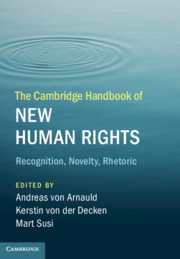Book contents
- The Cambridge Handbook of New Human Rights
- The Cambridge Handbook of New Human Rights
- Copyright page
- Contents
- Figures
- Contributors
- Acknowledgements
- Introduction
- Part I Cross-Cutting Observations
- Part II Public Good Rights
- Part III Status Rights
- Part IV New Technology Rights
- Part V Autonomy and Integrity Rights
- Part VI Governance Rights
- The Right to Democracy
- The Right to Good Administration
- The Right to Freedom from Corruption
- The Right of Access to Law
- 42 Bentham Redux
- 43 A Right of Access to Law – or Rather a Right of Legality and Legal Aid?
- Index
42 - Bentham Redux
Examining a Right of Access to Law
from The Right of Access to Law
Published online by Cambridge University Press: 04 January 2020
- The Cambridge Handbook of New Human Rights
- The Cambridge Handbook of New Human Rights
- Copyright page
- Contents
- Figures
- Contributors
- Acknowledgements
- Introduction
- Part I Cross-Cutting Observations
- Part II Public Good Rights
- Part III Status Rights
- Part IV New Technology Rights
- Part V Autonomy and Integrity Rights
- Part VI Governance Rights
- The Right to Democracy
- The Right to Good Administration
- The Right to Freedom from Corruption
- The Right of Access to Law
- 42 Bentham Redux
- 43 A Right of Access to Law – or Rather a Right of Legality and Legal Aid?
- Index
Summary
In this chapter I examine claims that the idea of ‘access to law’ should be accepted as a human right. I identify law’s pervasive presence in people’s lives, and argue that a person’s ability to comply with law’s direction, and to make use of law’s facilitative function, depends on their knowing and understanding the law. This, I argue, is a matter of human dignity, and calls for recognition of a wholly new right of access to law. I consider what the normative content of such a right might be, looking at how a state would meet obligations to ensure that law can be found, understood and readily complied with or used. I note, too, the risk of ‘rights inflation’, but argue for the genuine novelty of the proposed right. Alternatively, I consider how a right of access to law could be derived as an auxiliary right that is necessary for ensuring enjoyment of a range of substantive human rights, but I note that the resulting coverage is less than that of a stand-alone human right.
- Type
- Chapter
- Information
- The Cambridge Handbook of New Human RightsRecognition, Novelty, Rhetoric, pp. 541 - 554Publisher: Cambridge University PressPrint publication year: 2020
- 1
- Cited by

